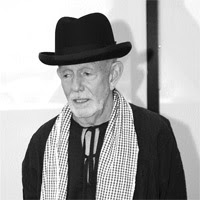 |
| INTROSPECTIVE: Peter Minshall |
Minshall the Younger, from ever since the time of River and Callaloo, and The Golden Calabash, has got word of Minshall the Elder's withdrawal from the Mas. Deeply troubled by the news, the younger Minshall travels through time and space to seek out the older Minshall, to find out what is the matter. They spend the entire Ash Wednesday afternoon of 2009 reminiscing, talking about the good times, the bad times, backwards and forwards, over the years. The young Minshall tells the story about his older self, himself talking to himself.
It had been a long afternoon and we were both weary. My penultimate question would cause pain and discomfort. I felt like an Inquisitor.
"You have been sitting in the wings for three years." I said. "You have not said a word. You have been looking on in silence. Tell us. What do you see in the Carnival of today?"
He seemed suddenly apprehensive, fearful, like a man standing at the edge of a high cliff. There was a long moment of silence. Then he leapt.
"The Carnival is an extraordinary mirror," he said.
"It reflects with gleaming precision exactly where the head of the country is, and its heart, and its body politic, from the Prime Minister right through to whoever washes his underwear. Look at the passing parade. See the greed and the power, and the utterly shallow, adolescent, vainglorious pomposity, nakedly exposed, with its phalanx of security guards, right there alongside the array of poverty, all in full view.
Both the Carnival and the Cabinet broadcast the grandest visions and themes. Both are invariably pretentiously empty. Feathers and beads. They constantly look copycat outwards, elsewhere, to find themselves. They look in vain and brag about being visionary, about being a first world country by 2020. What is it, this first world country? What is the recipe? Are its rivers and streams clear and unpolluted? Are its winds harvested for energy? Are its galvanised rooftops fitted with solar panels? Are its people content? Are they healthy, well fed and well mannered?
Who has the map, the plan, the chart? Who defines it? Who defines us? We are an island people. We are unique in the world. This is not a country to be like any and every other. This is a country to be like no other. Two islands, one love, one country, one people.
Our vision should be to show them, to lead them by example, not to follow them. If you really want to know where to go to find your self, begin by looking within your self. Your own best idea is you. You are a Fancy Sailor. You are a Pan Player. You are a Trinity. You are Africa, India and Europe, all together on an island. You are a remarkable vibrant hybrid creature of the Caribbean.
But look now at the cracked Carnival mirror. Beware. Wake up to your nightmare. You are not yourself anymore. You are collectively stuck in a rut, and sinking fast and furious, either as the tawdry repetitive imitation of a feathers and beads Las Vegas showgirl, or as a vacantly immature, emasculated, overly saccharine, Sweet Trinidadian, or as a participant in a bland museum diorama of Africa, as lifeless and bloodless as a pictorial National Geographic tour, passing by without the rousing heartbeat of a single drum, or the earth ever once being thunderously stamped into submission.
The King of the Carnival is the disembodied head of a lion, a discomforting tea cozy of a thing carried along blindly, with difficulty and insignificance, by two little black-clad feet that never rise up with joy to the raw beat of the music. The lion has no roar. The lion king has no integrity, no class, no real royal pedigree. Much like the king of the country.
I'd say we're in serious trouble. We've lost our soul. Or sold it."
He seemed broken, a crumpled figure at the bottom of a cliff, sitting there at the end of his white table among the anthuriums. But I challenged him nonetheless.
"Are you just going to sit there?" I asked. "What are you going to do about it?"
That old fire gleamed in his eyes for a second.
"Tribal politics has us nailed to the cross," he said.
"The country, the culture, the people, the music, the mas, has been crucified.
It is time to resurrect. Or to bury for good. We will see.
A grand finale perhaps."
He paused, held my gaze long and straight in the eye. Suddenly the warrior masman rose and loudly, exultantly proclaimed: "REZZAREK."
He fell back to his chair. He looked wistfully out towards the yard. He shouted to Humphrey Bogart to stop barking.
"Yes" he said, "We will see."
Epilogue: He had hoped that the People's Partnership would be the resurrection. He had wanted to raise a band of prayer flags in the Carnival to invoke the blessings of the Universe, to wish the Partnership well. It was to be called JHANDI. The band was scuttled. It was not to be. The Empress now lives in the Emperor's Palace. Prayers are now more needed than ever.








![Reblog this post [with Zemanta]](http://img.zemanta.com/reblog_e.png?x-id=a6e6ded1-1cf0-434a-bea4-faadb9595ae2)






